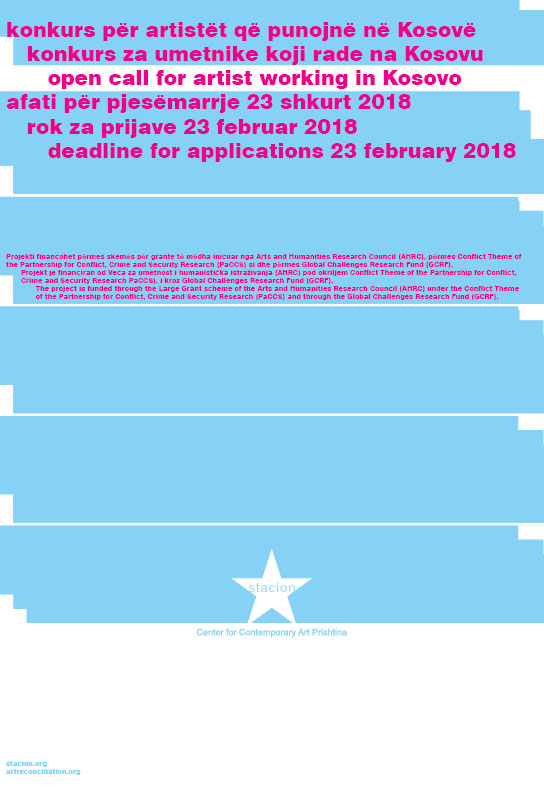
Open Call for Artists working in Kosovo
Application deadline: February 23, 2018
Stacion - Center for Contemporary Art Prishtina in collaboration with the University of the Arts London (UAL), is offering the opportunity for two artists or groups of artists to produce artwork in response to the themes of the research project that is investigating the potential for the arts to contribute positively to post conflict societies.
Two commissions will be undertaken in Kosovo.
The nature of the artwork is entirely open, and can take any form, including sculpture, film, performance, fine art, and photography.
Proposals that are socially engaged and or involve the participation or collaboration with a community or between communities are particularly welcome.
The fee for the commission will be 3000 euros inclusive of fees and production costs. The commission will be undertaken during the period March to May 2018, with the intention of exhibiting the final artwork for public viewing, depending on the nature of the artwork, in exhibitions organised in Sarajevo, Prishtina and London.
The proposals for the open call will be evaluated by a jury consisting of members Dr. Paul Lowe, University of the Arts London (UAL), Dr. Milena Michalski, Kings College, Albert Heta - Stacion - Center for Contemporary Art Prishtina, Erëmirë Krasniqi, Oral History Kosovo, and Nebojsa Milikic, REX Cultural Center, Belgrade.
Proposals of no more than 1000 words and the artists’ CV should be submitted by February 23, 2018 to the email address: application@stacion.org
Context of the Art Commissions
The project is one element of a larger overall research that seeks to conceive, design and implement a series of artistic interventions in the area of the former Yugoslavia.
Each intervention will involve the commissioning of an artist or group of artist to carry out the intervention. The interventions will investigate how different forms of artistic practice might affect the perceptions of inter group relations in the region. Each intervention will be evaluated to assess its impact on the artists involved, the participants in creating the artwork, and on targeted and general audiences. Treating the artistic process as emergent and the artist commission model in which impact is unpredictable, the research alongside this commission will focus on documenting and capturing the creative artistic process and the community response to the artistic intervention and the work that comes out of it.
Using qualitative, participatory methods the research is divided into two strands:
Research into the artist’s creative process and artistic ethos - through artist interviews, visual documentation and artists journals – with the aim of trying to capture and document the emergent quality of the artistic process for non-arts audiences (ie. donor audiences who struggle to understand and quantify creative processes)
Research into the local community’s response to the artwork. The art work will be installed in the Museum setting and audience’s responses to it will be evaluated through questionnaires and focus groups.
This commission is being undertaken as part an AHRC-funded research project that is investigating the concept and practice of reconciliation and the potential role of arts and artistic practices in reconciliation activities. The research project commenced in January 2017 and will end in December 2018. UAL is conducting research into the potential for the arts to contribute positively to post conflict societies. The research will involve the commissioning of a series of arts interventions, which will be evaluated for their impact.
Art and Reconciliation is an innovative and collaborative inter-disciplinary research project involving King’s College London (War Studies), the London School of Economics (Government) and the University of the Arts in London (London College of Communication) [Project Team] and non-academic collaborators in its design, production and delivery, commissioning artists in a variety of media to create and develop practices and artefacts.
This inter-disciplinary project combines history, conflict resolution methodologies, art and creative practice, and both qualitative and quantitative social sciences. The expert team of investigators include Dr. Rachel Kerr and Professor James Gow of the Department of War Studies at King’s College London, Dr. Denisa Kostovicova of the Department of Government, London School of Economics, and Dr. Paul Lowe of the London College of Communication, University of the Arts in London. In addition, the project has its own Artist-in-residence, Dr. Milena Michalski, and will work closely with NGO project partners and art and culture institutions to shape its design, production and delivery.
The research is funded through the Large Grant scheme of the Arts and Humanities Research Council (AHRC) under the Conflict Theme of the Partnership for Conflict, Crime and Security Research (PaCCS) and through the Global Challenges Research Fund (GCRF).